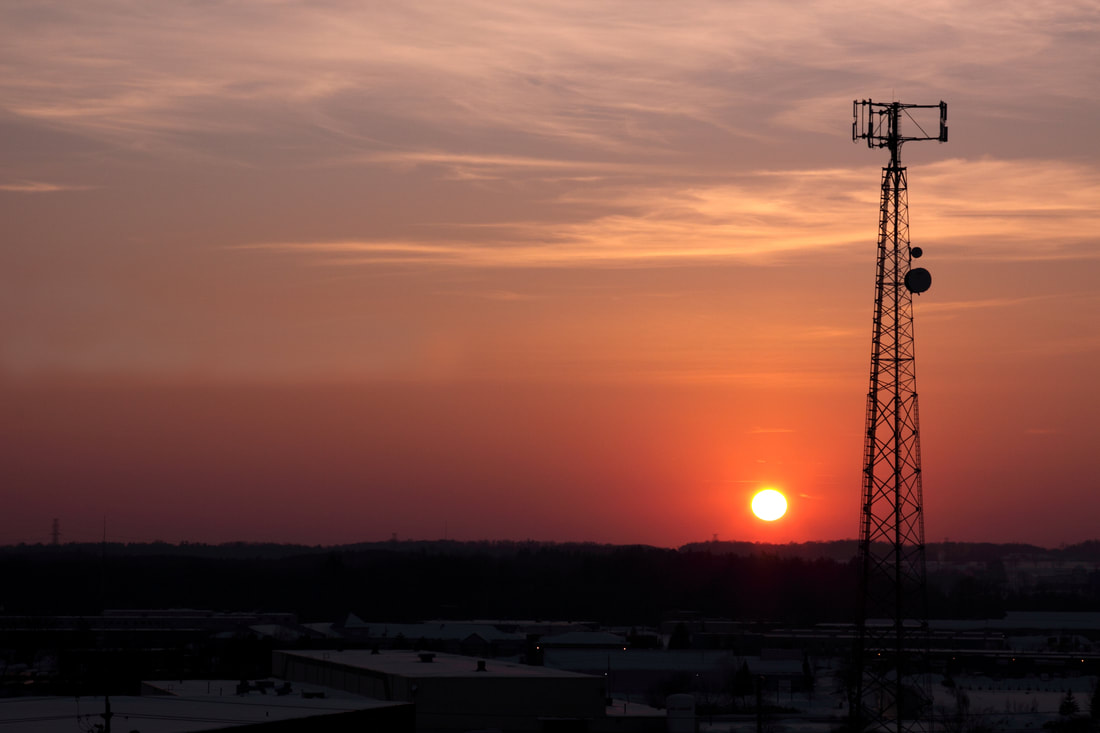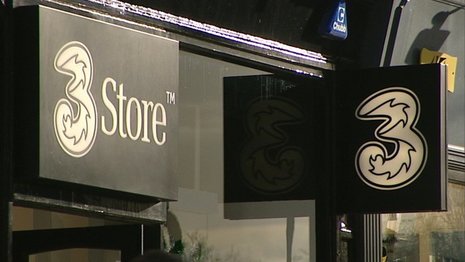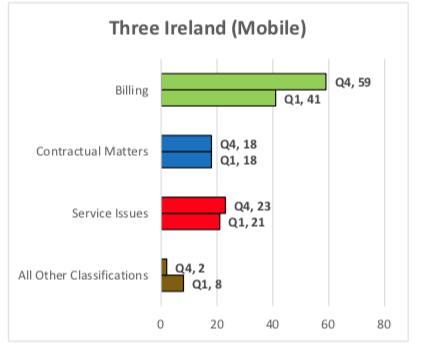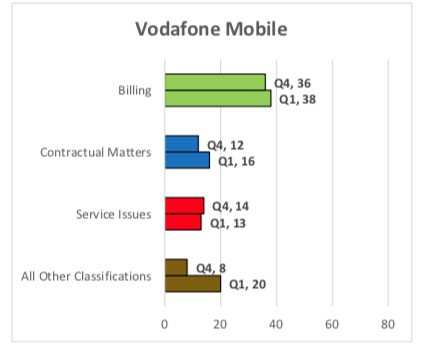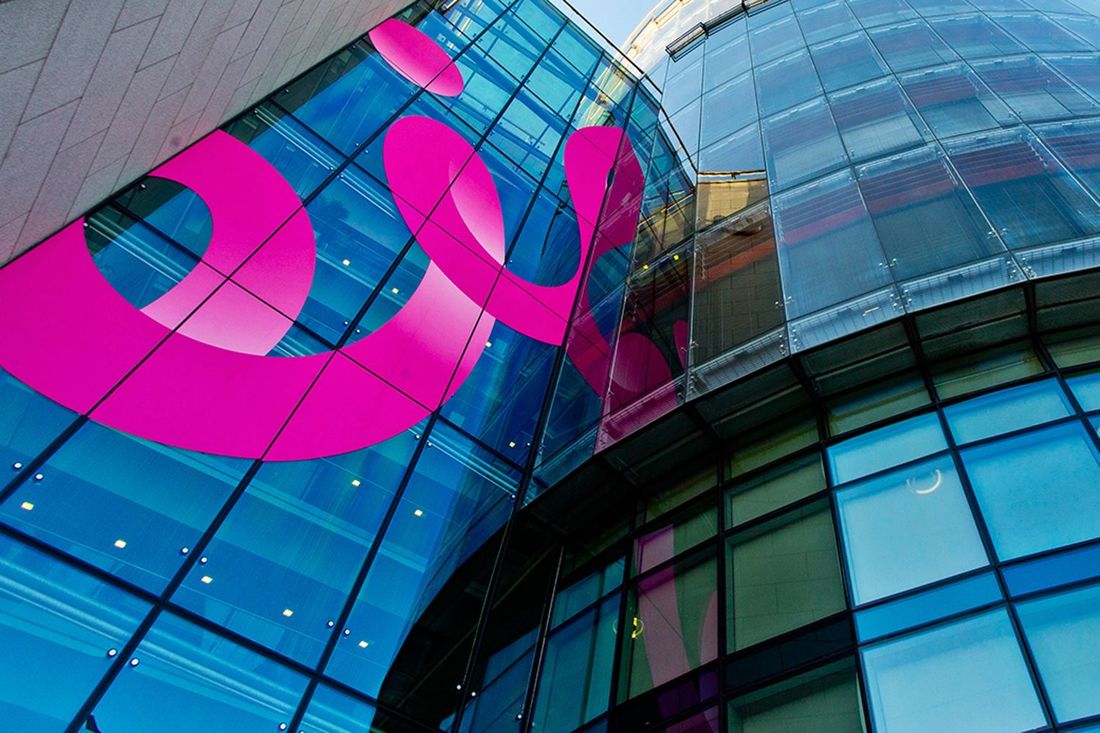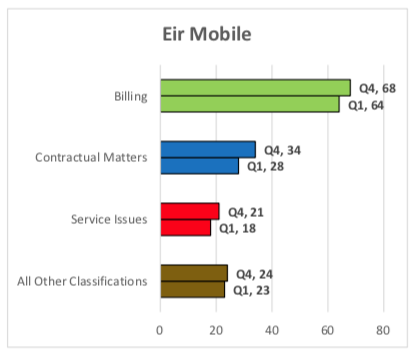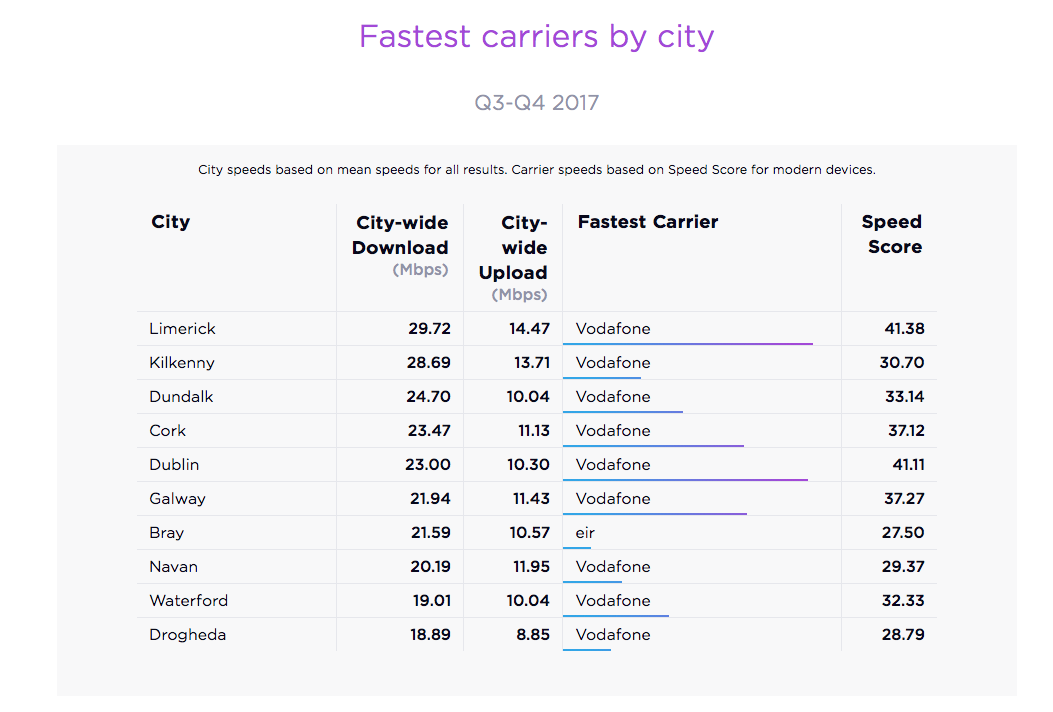The State of Irish Mobile Networks: Summer 2018
Let's see how Ireland's mobile networks are fairing and learn what they're up to.
Published 02/07/18
Three is nearing the end of a long struggle
|
Three's 'Big Upgrade' programme is nearing its completion in the majority of the country. The programme has consolidated two separate networks to create one unified network built to carry data. It's been a long struggle for the company, tarnishing its reputation to provide its customers with a quality service. There's no other way to put it, the service that Three provided its customers over the last number of years has been outright atrocious. If there were no contracts that forced people to stick with Three, the company would have been deserted by pretty much every customer. People wanted unlimited data, but they wanted to be able to use that data, something that Three's former network couldn't facilitate. For a long time, Vodafone and Eir have had vastly more advanced networks than Three. They boasted higher customer satisfaction and capitalised on Three's weakness. Those days are over now, and Eir can no longer tout its network supremacy over Three.
|
I've managed to obtain some more precise coverage data from Three themselves. Three provides over 94% 4G population coverage in Ireland. Three now delivers 94% 4G coverage across Donegal. Three now delivers 93% 4G coverage across Carlow. Three now delivers 99% 4G coverage across Kilkenny. Three now delivers 96% 4G coverage across Louth. Three now delivers 95% 4G coverage across Monaghan. These figures are impressive, especially considering 'The Big Upgrade' programme is yet to be completed. Three's 4G network is similar in footprint to Eir's, but significantly behind Vodafone's in terms of geographic 4G coverage. However, all these improvements have yet to reach every part of the country. I live in Wexford, which Three has told me is the last county to be upgraded and works will begin over this Summer. Three customers in Wexford have little access to 4G coverage, even in major towns. It's still a joke.
I can confirm that Three has over 900 live 4G+ sites in Ireland, a much larger number than what Eir has. Three's 4G+ network is excellent, where it is available. I've gotten the opportunity to use it on multiple occasions throughout the south-east, easily exceeding 100Mbps. Three plans to roll the technology out to all of its towers when 'The Big Upgrade' is completed. The network boasts theoretical maximum speeds of 400Mbps, thanks to a combination of 256 QAM and three carrier aggregation. In this area, Three's 4G+ network is similar in size to that provided by Vodafone. That's a huge achievement considering Vodafone was first to launch a 4G+ network here.
The most interesting metric that summarises Three's dramatic turnaround is 4G speeds. Three now has Ireland's second-fastest 4G network, according to OpenSiganl data. This will have to be verified by Ookla at the end of this year. Three has the most spectrum of any network in Ireland. That gives the company an advantage over its competitors. That spectrum is being put to use, Three's network offers much greater capacity than that of Eir and Vodafone in many areas. However, very high data usage on Three's network results in speeds that are slower than Vodafone's for the moment. Speeds will continue to increase as Three densifies its network, deploys more spectrum, and upgrades more areas to 4G. That isn't to say that Three's 4G speeds are great everywhere, believe me, they're far from it in congested areas such as cities.
The expansion of Three's 4G network has also benefited its 3G network. There is now less load on Three's 3G network as more traffic has shifted to the 4G network. This means 3G speeds have improved. In terms of 3G coverage and speeds, Three's network is ahead of Eir by quite a lot and similar to Vodafone. Three's 4G footprint is still smaller than Vodafone's, Three customers (with 4G capable devices) spend more time on 3G. Three now provides High Definition (HD Voice) calls between Three customers. This uses Three's 3G network, rather than 2G which is used for inter-network calls as HD Voice is not yet available between mobile networks in Ireland.
Looking to 5G, Three is likely to launch a home broadband option. This will utilise the gigabit capacity of 5G to deliver reliable home broadband to homes that may not have fibre access. It can't afford to screw up its 5G network like it did with 4G because 5G will be used to connect millions of more devices. Three will invest €100 million a year in Ireland to facilitate the rollout of 5G. The network managed to secure 100MHz of nationwide spectrum for €20.3 million in ComReg's 3.6GHz spectrum auction last year. Three claims that this will allow it to be the only network that will be capable of providing the same capacity in Dublin as in a rural area such as Donegal.
To sum up the state of Three's network in Summer 2018, I'd say its in good shape. Continued upgrades are required to push it to the level of Vodafone and there are still areas that require some significant work. It's overtaken Eir, both in terms of coverage and speed. Three's network has the capacity to carry large amounts of data traffic going into the future and its rapidly expanding 4G+ network is simply brilliant. Three now needs to shake off the bad image it has developed by providing a horrible customer experience.
I can confirm that Three has over 900 live 4G+ sites in Ireland, a much larger number than what Eir has. Three's 4G+ network is excellent, where it is available. I've gotten the opportunity to use it on multiple occasions throughout the south-east, easily exceeding 100Mbps. Three plans to roll the technology out to all of its towers when 'The Big Upgrade' is completed. The network boasts theoretical maximum speeds of 400Mbps, thanks to a combination of 256 QAM and three carrier aggregation. In this area, Three's 4G+ network is similar in size to that provided by Vodafone. That's a huge achievement considering Vodafone was first to launch a 4G+ network here.
The most interesting metric that summarises Three's dramatic turnaround is 4G speeds. Three now has Ireland's second-fastest 4G network, according to OpenSiganl data. This will have to be verified by Ookla at the end of this year. Three has the most spectrum of any network in Ireland. That gives the company an advantage over its competitors. That spectrum is being put to use, Three's network offers much greater capacity than that of Eir and Vodafone in many areas. However, very high data usage on Three's network results in speeds that are slower than Vodafone's for the moment. Speeds will continue to increase as Three densifies its network, deploys more spectrum, and upgrades more areas to 4G. That isn't to say that Three's 4G speeds are great everywhere, believe me, they're far from it in congested areas such as cities.
The expansion of Three's 4G network has also benefited its 3G network. There is now less load on Three's 3G network as more traffic has shifted to the 4G network. This means 3G speeds have improved. In terms of 3G coverage and speeds, Three's network is ahead of Eir by quite a lot and similar to Vodafone. Three's 4G footprint is still smaller than Vodafone's, Three customers (with 4G capable devices) spend more time on 3G. Three now provides High Definition (HD Voice) calls between Three customers. This uses Three's 3G network, rather than 2G which is used for inter-network calls as HD Voice is not yet available between mobile networks in Ireland.
Looking to 5G, Three is likely to launch a home broadband option. This will utilise the gigabit capacity of 5G to deliver reliable home broadband to homes that may not have fibre access. It can't afford to screw up its 5G network like it did with 4G because 5G will be used to connect millions of more devices. Three will invest €100 million a year in Ireland to facilitate the rollout of 5G. The network managed to secure 100MHz of nationwide spectrum for €20.3 million in ComReg's 3.6GHz spectrum auction last year. Three claims that this will allow it to be the only network that will be capable of providing the same capacity in Dublin as in a rural area such as Donegal.
To sum up the state of Three's network in Summer 2018, I'd say its in good shape. Continued upgrades are required to push it to the level of Vodafone and there are still areas that require some significant work. It's overtaken Eir, both in terms of coverage and speed. Three's network has the capacity to carry large amounts of data traffic going into the future and its rapidly expanding 4G+ network is simply brilliant. Three now needs to shake off the bad image it has developed by providing a horrible customer experience.
Vodafone is Pioneering Ireland's Gigabit society
|
Vodafone continues to demonstrate its ability to innovate, time and time again, putting the customer first. Recently, the network carried out Ireland's first live 5G test. It's successful implementation of NB-IoT, one of the first in Europe, means millions of devices can now connect to one network. This allows the Internet of Things to expand on a mass scale, opening new opportunities for businesses and cities. The network, through its partnership with the ESB under the brand SIRO, has continued its efforts to provide gigabit broadband to towns and villages. Vodafone also tested gigabit 4G speeds last year, as part of its ever-expanding 4G+ network. Vodafone's presence in the Irish market has brought huge benefits to both the individual customer and businesses.
|
Vodafone has Ireland's largest 4G network, its managed to maintain that title for many years now. It now claims over 96% 4G population coverage, with at least 90% 4G population coverage in every county. That's a huge achievement for Vodafone, it means its network reaches more people than either Eir or Three. The omnipresence of Vodafone's 4G network has allowed it to have the largest customer base in the Irish mobile space.
ComReg's latest Consumer Line Statistics Report shows an interesting trend. Vodafone has the lowest number of complaints among Ireland's mobile networks relating to service issues. This isn't surprising considering its network is the largest, fastest and most reliable. What is very interesting, however, is the fact that complaints relating to service issues have fallen 20% compared to this time last year. This is a testament to the fact that Vodafone continues to expand and improve its network, even if it is already leading. It's important that Vodafone continues this path and doesn't become complacent.
Vodafone's 4G speeds have continued to increase steadily in areas where 4G+ has been deployed. Vodafone's 4G+ network is the largest in Ireland, now available in many towns and cities. Testing it on a frequent basis, I achieve speeds consistently breeching 100Mbps. To be fair, I didn't achieve the maximum speeds that I found while testing Three's own 4G+ network, but speeds were much more consistent on Vodafone's 4G+ network. Vodafone's 4G+ network boasts theoretical maximum speeds of over 300Mbps.
In terms of standard 4G speeds, I can say that they have remained steady even as data usage has skyrocketed. There are areas where Vodafone's 4G network fairs pretty poorly during rush hour because of insufficient capacity. These congestion issues will only be exacerbated over time if not addressed. Ookla's most recent report on the Irish market paints a very pretty picture for the company. Vodafone has the fastest mobile network in nine out of the ten most populated urban areas in Ireland, an incredible example of its network prowess. Its average national speed is 24.33Mbps, almost a full 10Mbps faster than the second fastest network.
It remains unclear about the rollout of VoLTE and WiFi Calling on Vodafone's network. To be honest, I don't believe these are a major priority for the network at the moment. On the topic of roaming, I still think it is ridiculous that Vodafone is the only Irish network to offer true 4G roaming across the globe. I should mention, however, that there have been suspicions that mobile customers roaming abroad have had their service throttled quite significantly. Unfortunately, I cannot comment on this as I have yet to experience such issues.
Vodafone's 3G network continues to become faster, as more people shift to 4G networks instead. Vodafone has Ireland's largest and fastest 3G network. It outperforms Eir's 3G network by quite a bit and is ahead of Three. The 3G network carries HD Voice calls between Vodafone's customers, who were first to gain access to the technology in Ireland.
To conclude, it's fair to say that Vodafone is the most innovative mobile network in Ireland that has consistently shown its commitment to invest in the country to one day fulfil its goal of creating a 'Gigabit Society' in Ireland. That goal is becoming closer to a reality every day. It gives me great pleasure to say that when that goal is fulfilled, it will benefit everyone in Ireland and provide the tools for the next generation to be even more innovative and transformative than the last.
ComReg's latest Consumer Line Statistics Report shows an interesting trend. Vodafone has the lowest number of complaints among Ireland's mobile networks relating to service issues. This isn't surprising considering its network is the largest, fastest and most reliable. What is very interesting, however, is the fact that complaints relating to service issues have fallen 20% compared to this time last year. This is a testament to the fact that Vodafone continues to expand and improve its network, even if it is already leading. It's important that Vodafone continues this path and doesn't become complacent.
Vodafone's 4G speeds have continued to increase steadily in areas where 4G+ has been deployed. Vodafone's 4G+ network is the largest in Ireland, now available in many towns and cities. Testing it on a frequent basis, I achieve speeds consistently breeching 100Mbps. To be fair, I didn't achieve the maximum speeds that I found while testing Three's own 4G+ network, but speeds were much more consistent on Vodafone's 4G+ network. Vodafone's 4G+ network boasts theoretical maximum speeds of over 300Mbps.
In terms of standard 4G speeds, I can say that they have remained steady even as data usage has skyrocketed. There are areas where Vodafone's 4G network fairs pretty poorly during rush hour because of insufficient capacity. These congestion issues will only be exacerbated over time if not addressed. Ookla's most recent report on the Irish market paints a very pretty picture for the company. Vodafone has the fastest mobile network in nine out of the ten most populated urban areas in Ireland, an incredible example of its network prowess. Its average national speed is 24.33Mbps, almost a full 10Mbps faster than the second fastest network.
It remains unclear about the rollout of VoLTE and WiFi Calling on Vodafone's network. To be honest, I don't believe these are a major priority for the network at the moment. On the topic of roaming, I still think it is ridiculous that Vodafone is the only Irish network to offer true 4G roaming across the globe. I should mention, however, that there have been suspicions that mobile customers roaming abroad have had their service throttled quite significantly. Unfortunately, I cannot comment on this as I have yet to experience such issues.
Vodafone's 3G network continues to become faster, as more people shift to 4G networks instead. Vodafone has Ireland's largest and fastest 3G network. It outperforms Eir's 3G network by quite a bit and is ahead of Three. The 3G network carries HD Voice calls between Vodafone's customers, who were first to gain access to the technology in Ireland.
To conclude, it's fair to say that Vodafone is the most innovative mobile network in Ireland that has consistently shown its commitment to invest in the country to one day fulfil its goal of creating a 'Gigabit Society' in Ireland. That goal is becoming closer to a reality every day. It gives me great pleasure to say that when that goal is fulfilled, it will benefit everyone in Ireland and provide the tools for the next generation to be even more innovative and transformative than the last.
Trouble is in the Eir
Eir's mobile network has stood still since it was acquired by Xavier Niel earlier this year. The inaction of Eir has jeopardised its networks prowess. Three has left them in the dust, both in terms of 4G coverage and speed, and Vodafone continues to advance its own network at a much faster pace. It really is a shame because there was point last year when Eir's 4G coverage was similar to Vodafone. Eir won several awards for its network speed from RootMetrics and Switcher. Today, its hard to see Eir winning any awards for its network, 4G speeds have plunged and its 4G+ network is miniature compared to those of Vodafone and Three.
Eir claims to have 96% 4G population coverage in Ireland. That figure is the same as the one touted by Vodafone but don't let it deceive you. Eir's geographic 4G coverage is much smaller than Vodafone. As mentioned earlier, Three's 4G coverage is similar to Eir, but Three is expanding its 4G network significantly faster. In a few months time, a large gap will begin to develop between Three and Eir. Something else I'd like to mention is the hypocrisy of Eir's coverage map. It's just completely inaccurate, something I suspect is by design. Don't be fooled, its 4G coverage certainly does not cover every area highlighted on the map.
4G speeds on Eir have experienced a rapid fall from grace. In short, data from Ookla shows they have fallen quite dramatically over the past two years. At the same time, Three's 4G speeds are climbing higher and higher. Eir's 4G network is fairing so poorly in many areas that it is simply unusable. I've experienced this and believe me, it most definitely isn't pleasant. Testing an Eir SIM recently, I frequently had to turn off 4G and switch to 3G to watch videos on YouTube because of constant buffering. To put this into perspective, I was receiving over 60Mbps on Vodafone and 15Mbps on Three in the exact same place. With Eir, it was 0.14Mbps.
The degradation of Eir's 4G network is something the company should try to reverse, and fast. Its share in the mobile broadband market is falling, even if it already has the smallest share of the three mobile networks in Ireland. The same trend is occurring in terms of M2M subscriptions where Eir holds just 2.6% market share when Vodafone and Three hold a combined 97.4% market share. Eir's average revenue per customer trails that of Vodafone and Three, by a significant percentage. It's not a pretty picture for Eir, whatever way you put it. The above figures can be found in ComReg's latest Quarterly Key Data report.
Eir is the only Irish network to provide WiFi Calling, which is helpful for those who are unable to make calls in their home because of poor signal. Unfortunately, this feature is pointless to most Eir customers because it is only available on a limited number of plans, mainly more expensive bill pay plans. Eir's 4G+ network is poor, it's mostly limited to areas within cities and I never managed to achieve speeds close to the highs I got with Vodafone or Three.
To finish this piece, I can only say one thing. I'm disappointed with the state of Eir's mobile network in 2018. Its 4G speeds continue to fall and are now unusable in many places. Its 4G coverage is on the verge of being trumped by Three and its failure to expand its 4G+ network at a fast pace means Vodafone is even further ahead. Eir needs to do something, from my point of view it seems the company prioritises its broadband monopoly at the expense of its mobile network. Eir's customers will ultimately suffer from this negligence.
Eir claims to have 96% 4G population coverage in Ireland. That figure is the same as the one touted by Vodafone but don't let it deceive you. Eir's geographic 4G coverage is much smaller than Vodafone. As mentioned earlier, Three's 4G coverage is similar to Eir, but Three is expanding its 4G network significantly faster. In a few months time, a large gap will begin to develop between Three and Eir. Something else I'd like to mention is the hypocrisy of Eir's coverage map. It's just completely inaccurate, something I suspect is by design. Don't be fooled, its 4G coverage certainly does not cover every area highlighted on the map.
4G speeds on Eir have experienced a rapid fall from grace. In short, data from Ookla shows they have fallen quite dramatically over the past two years. At the same time, Three's 4G speeds are climbing higher and higher. Eir's 4G network is fairing so poorly in many areas that it is simply unusable. I've experienced this and believe me, it most definitely isn't pleasant. Testing an Eir SIM recently, I frequently had to turn off 4G and switch to 3G to watch videos on YouTube because of constant buffering. To put this into perspective, I was receiving over 60Mbps on Vodafone and 15Mbps on Three in the exact same place. With Eir, it was 0.14Mbps.
The degradation of Eir's 4G network is something the company should try to reverse, and fast. Its share in the mobile broadband market is falling, even if it already has the smallest share of the three mobile networks in Ireland. The same trend is occurring in terms of M2M subscriptions where Eir holds just 2.6% market share when Vodafone and Three hold a combined 97.4% market share. Eir's average revenue per customer trails that of Vodafone and Three, by a significant percentage. It's not a pretty picture for Eir, whatever way you put it. The above figures can be found in ComReg's latest Quarterly Key Data report.
Eir is the only Irish network to provide WiFi Calling, which is helpful for those who are unable to make calls in their home because of poor signal. Unfortunately, this feature is pointless to most Eir customers because it is only available on a limited number of plans, mainly more expensive bill pay plans. Eir's 4G+ network is poor, it's mostly limited to areas within cities and I never managed to achieve speeds close to the highs I got with Vodafone or Three.
To finish this piece, I can only say one thing. I'm disappointed with the state of Eir's mobile network in 2018. Its 4G speeds continue to fall and are now unusable in many places. Its 4G coverage is on the verge of being trumped by Three and its failure to expand its 4G+ network at a fast pace means Vodafone is even further ahead. Eir needs to do something, from my point of view it seems the company prioritises its broadband monopoly at the expense of its mobile network. Eir's customers will ultimately suffer from this negligence.
